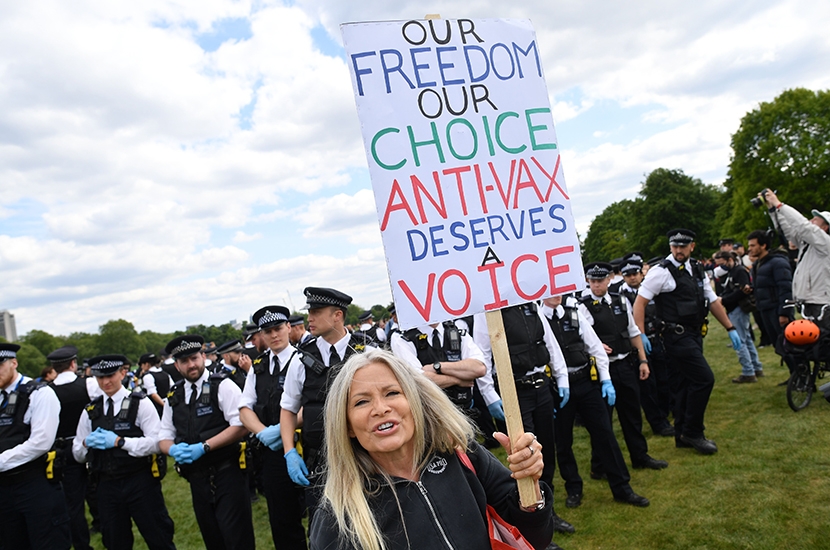Earlier this week, the Labour party wrote to the government urging it to bring forward legislation so that social media companies which fail to ‘stamp out dangerous anti-vaccine content’ can face financial and criminal penalties. ‘The government has a pitiful track record on taking action against online platforms that are facilitating the spread of disinformation,’ said Jo Stevens, Labour’s shadow culture secretary. ‘This is literally a matter of life and death and anyone who is dissuaded from being vaccinated because of this is one person too many.’
My first thought on hearing this was how pitifully out of touch the Labour party is. Does Keir Starmer not realise how zealous social media companies are when it comes to censoring anything that challenges Covid orthodoxy? In the name of protecting the public from ‘disinformation’, YouTube removed a recording of Lionel Shriver reading out one of her anti-lockdown Spectator columns, Twitter blocked an anti-masking tweet from Dr Scott Atlas, a White House Coronavirus Task Force adviser, and Facebook deleted a post by Donald Trump claiming that children were ‘almost immune’ from Covid-19. The danger isn’t that these companies will turn a blind eye to ‘anti-vaccination content’, but that they’ll censor entirely legitimate concerns raised by doctors and scientists. That’s a genuine risk, given that it looks like Covid vaccination will be made mandatory in some countries.
Censoring ‘anti-vaccination content’ is likely to be counter-productive
If it were just the Labour party calling for more censorship I wouldn’t be that worried. After all, Labour wants to ban everything, from Tony the Tiger to fast-food restaurants near schools. But a report was issued recently on behalf of the Royal Society and the British Academy calling for the spreading of ‘Covid-19 misinformation’ to be a criminal offence. The report’s author, Professor Melinda Mills, looks at China as a case study in this respect, noting the country’s ‘punishment’ of those who disseminate Covid ‘rumours’. She is apparently unaware that in December the communist authorities arrested several doctors in Wuhan for spreading ‘rumours’ about a new life-threatening coronavirus.
This, surely, is a perfect illustration of the danger of allowing the state to dictate what doctors and scientists can and cannot say. It will simply designate anything posing a threat to its authority as ‘misinformation’. Had the Chinese authorities not had the power to silence the ‘rumour’ mongers, they would have been forced to act earlier and might have nipped the outbreak in the bud. Researchers at the University of Southampton looked at what difference it would have made if a travel ban and other containment measures had been put in place in Hubei province as soon as the doctors raised the alarm. They concluded that cases would have been reduced by 95 per cent.
Another risk of censoring ‘anti-vaccination content’ is that it’s likely to be counter-productive when it comes to reassuring people who have reservations about the vaccine. They will conclude, rightly or wrongly, that the anti-vaxxers have a point. If their arguments are easily rebutted, why won’t the authorities take them on in the public square? The fence-sitters will become more anxious, not less, if the pro-vaxxers have to rely on censorship. A basic grasp of psychology suggests that the way to allay people’s misplaced fears is via unrestricted debate. As the US Supreme Court Justice Louis Brandeis once said: ‘If there be time to expose through discussion, the falsehoods and fallacies, to avert the evil by the processes of education, the remedy to be applied is more speech, not enforced silence.’
Underpinning these calls for new censorship laws is a supercilious contempt for ordinary people. Reading Professor Mills’s report, it’s as though it’s written by a Vulcan instructing other Vulcans on how best to get Earthlings to do their bidding. Reasoning with them, relying on evidence and logic, is hopeless, she thinks. No, according to ‘vaccine deployment experts’, the secret is to appeal to ‘emotions’ by using ‘personal and anecdotal information’. What Mills and her fellow scientists don’t seem to realise is that it’s precisely this attitude — regarding the proles as a sub-species whom it’s perfectly OK to manipulate — which has led to a lack of trust in science. They would do much better to criticise the government for engaging in similar tactics, rather than trying to enlist its support in a misguided effort to further restrict public debate.







Comments